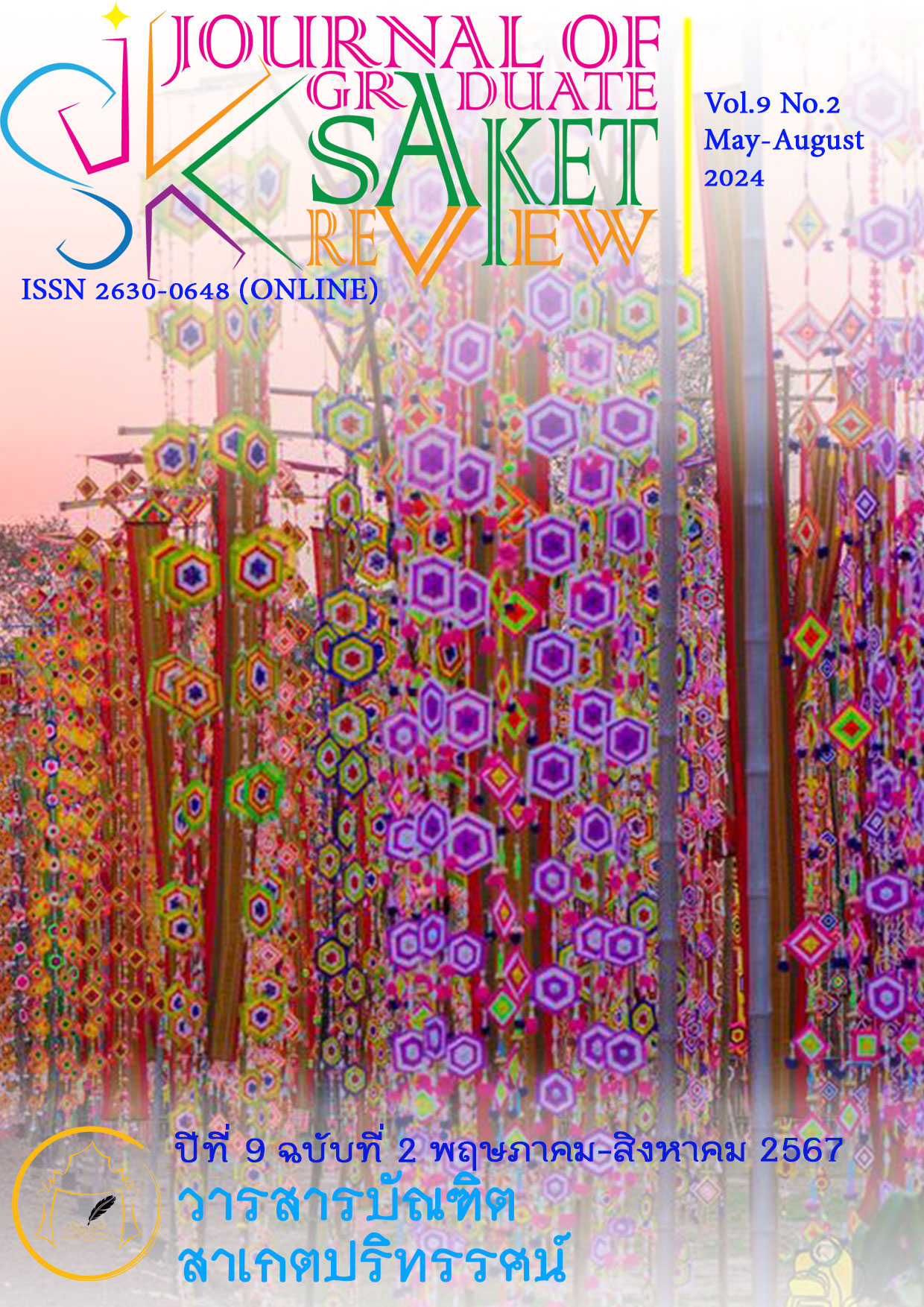An Application of the Principles of Sanghavatthu 4 for Enhancing the Health of Community in Ban Dau Subdistrict, Maung District, Nongkhai Province An Application of the Principles of Sanghavatthu 4 for Enhancing the Health of Community in Ban Dau Subdistrict, Maung District, Nongkhai Province
Main Article Content
Abstract
The purposes of this research are; (1) to study the principles of Sangahavatthu 4 in Buddhism (2) to study the state of enhancing the health of the community in Ban Dau Subdistrict, Muang District, and Nongkhai Province and (3) to apply the principles of Sangahavatthu 4 for enhancing the health of the community in Ban Dau Subdistrict, Muang District, Nongkhai Province. The qualitative methodology is applied by studying the documents and related researches including the in depth of interviews from the 25 key informants and analyzes the data by using descriptive analysis. The results of the research are found as follows
The research results found that
The 4 principles of Sangha Vatthu in Buddhism include: 1. Giving, giving, sacrificing, and sharing for the benefit of others. Help cultivate people who are selfless and share with each other. 2. Piyawaja: speaking with sweet, sweet, sincere words, not rude or aggressive. say useful things Suitable for the occasion, speaking kindly to each other, 3. Atthachariya, helping each other, and 4. Samanatta, which is to behave consistently and consistently.
Conditions of promoting health of the community in Ban Duea Subdistrict, Mueang District, Nong Khai Province It is the management of community problems in each aspect as follows: (1) physical aspect, a safe and clean environment Creation and maintenance of health facilities (2) Morality, respect for rights and equality Voluntary provision of information and decision making (3) Psychological aspect, mental health support Building confidence and hope (4) Intellectual aspect, providing education and creating knowledge.
Application of the 4 principles of Sangha Vatthu to promote community health. Ban Duea Subdistrict, Mueang District, Nong Khai Province, consisting of (1) alms, donations of food and items (2) Piyawaja, providing health advice, that is, Piyawaja can be used to suggest guidelines for good health care (3) Atthachariya, honesty Equality 1. Fairness, generosity, equality (4) Samanatata to promote health. is to act consistently Practice consistently among all people.
Article Details

This work is licensed under a Creative Commons Attribution-NonCommercial-NoDerivatives 4.0 International License.
เนื้อหาและข้อมูลในบทความที่ลงตีพิมพ์ในวารสารบัณฑิตสาเกตปริทรรศน์ ถือเป็นข้อคิดเห็นและความรับผิดชอบของผู้เขียนบทความโดยตรงซึ่งกองบรรณาธิการวารสาร ไม่จำเป็นต้องเห็นด้วย หรือร่วมรับผิดชอบใด ๆบทความ ข้อมูล เนื้อหา รูปภาพ ฯลฯ ที่ได้รับการตีพิมพ์ในวารสารบัณฑิตสาเกตปริทรรศน์ ถือเป็นลิขสิทธิ์ของวารสารบัณฑิตสาเกตปริทรรศน์ หากบุคคลหรือหน่วยงานใดต้องการนำทั้งหมดหรือส่วนหนึ่งส่วนใดไปเผยแพร่ต่อหรือเพื่อกระทำการใด ๆ จะต้องได้รับอนุญาตเป็นลายลักอักษรจากวารสารบัณฑิตสาเกตปริทรรศน์ ก่อนเท่านั้น
References
ภาษาไทย
จำนงค์ อดิวัฒนสิทธิ์. (2545). สังคมวิทยา. พิมพ์ครั้งที่ 9. กรุงเทพมหานคร: มหาวิทยาลัยเกษตรศาสตร์.
ธรรมรักษา. (2536). พระไตรปิฎกดับทุกข์ฉบับ 11. กรุงเทพมหานคร: สำนักพิมพ์สติ.
บุญธิดา แก้วทอง. (2565). แนวทางการเสริมสร้างมนุษยสัมพันธ์ของบุคลากรตามหลักสังคหวัตถุ 4 ของผู้บริหารสถานศึกษาโรงเรียนประถมศึกษา อำเภอตากฟ้า จังหวัดนครสวรรค์. วิทยานิพนธ์ครุศาสตรมหาบัณฑิต สาขาวิชาพุทธบริหารการศึกษา. บัณฑิตวิทยาลัย: มหาวิทยาลัยมหาจุฬาลงกรณราชวิทยาลัย.
ประชัน เมืองโพธิ์. (2565). การประยุกต์ใช้หลักสังคหวัตถุ 4 เพื่อส่งเสริมการมีส่วนร่วมของชุมชนในการจัดการธนาคารขยะวัดหนองไม้แก่น ตำบลหนองลาน อำเภอท่ามะกา จังหวัดกาญจนบุรี. วิทยานิพนธ์พุทธศาสตรดุษฎีบัณฑิต สาขาวิชาพระพุทธศาสนา. บัณฑิตวิทยาลัย: มหาวิทยาลัยมหาจุฬาลงกรณราชวิทยาลัย.
พุทธทาสภิกขุ. (2551). พุทธธรรมประยุกต์. กรุงเทพมหานคร: ธรรมทานมูลนิธิ.
พระครูสถิตพัฒนโสภณ (ไพฑูรย์ ฐิตโสภโณ). (2566). การส่งเสริมบทบาทด้านสาธารณะสงเคราะห์ตามหลักเชิงพุทธของพระคิลานุปัฏฐาก จังหวัดลำพูน. วิทยานิพนธ์พุทธศาสตรมหาบัณฑิต สาขาวิชาพระพุทธศาสนา. บัณฑิตวิทยาลัย: มหาวิทยาลัยมหาจุฬาลงกรณราชวิทยาลัย.
มหาจุฬาลงกรณราชวิทยาลัย. (2539). พระไตรปิฎกภาษาไทย ฉบับมหาจุฬาลงกรณราชวิทยาลัย. กรุงเทพมหานคร: โรงพิมพ์มหาจุฬาลงกรณราชวิทยาลัย.
ภาษาอังกฤษ
Adiwatthanasit J. (2002). Sociology. 9th ed. Bangkok: Kasetsart University.
Buddhadasa Bhikkhu. (2008). Applied Buddhism. Bangkok: Dhammadana Foundation.
Kaewthong B. (2022). Guidelines for enhancing human relations of personnel according to the principles of the four social objects of primary school administrators in Tak Fa District, Nakhon Sawan Province. Master of Education Thesis in Buddhist Educational Administration. Graduate School: Mahachulalongkornrajavidyalaya University.
Muangpho p. (2022). Application of the principles of the four social objects to promote community participation in the management of the waste bank at Wat Nong Mai Kaen, Nong Lan Subdistrict, Tha Maka District, Kanchanaburi Province. Doctor of Philosophy Thesis in Buddhism. Graduate School: Mahachulalongkornrajavidyalaya University.
Mahachulalongkornrajavidyalaya University. (1996). Thai Tripitaka, Mahachulalongkornraja vidyalaya Edition. Bangkok: Mahachulalongkornrajavidyalaya University Printing House.
Phrakhru Sathitphatthansophon (Phaithun Thitsophon). (2023). Promoting the role of public welfare according to Buddhist principles of the monks who care for the sick in Lamphun Province. Master of Buddhist Studies Thesis, Department of Buddhism. Graduate School: Mahachulalongkornrajavidyalaya University.
Thammaraksa. (2003). Tripitaka Dabduk Edition 11. Bangkok: Sati Publishing House.


